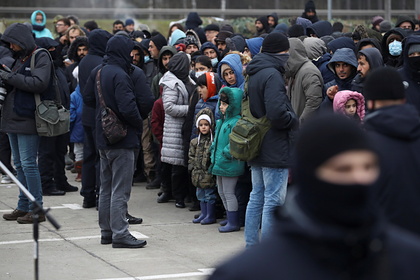A delegation from Iran arrived at the accommodation point for migrants at the border of Belarus 
At the accommodation point for migrants located in a warehouse near the Belarusian-Polish border , special guests arrived – representatives of the Iranian Foreign Ministry. The delegation is looking for their fellow citizens in Belarus and wants to persuade them to return home, BelTA reports in its Telegram channel.
Diplomats from Iran arrived at the logistics center on the morning of December 2. The purpose of the visit was a desire to assess the living conditions of refugees temporarily placed here, as well as to communicate with representatives of the Red Cross.
Related materials 00:01 – 28 November ” We will kill you, wait for us “Thousands of Afghans fled from the Taliban to Tajikistan. Why are they still afraid for their lives? 15: 31 – 11 November
 They are not expected. How the desire of thousands of migrants to break through from Belarus to Europe led to casualties and an international scandal
They are not expected. How the desire of thousands of migrants to break through from Belarus to Europe led to casualties and an international scandal
Once inside, the Iranians began to look for compatriots in the camp. According to some reports, there are 10-12 Iranian citizens among the thousands of refugees. In an attempt to find them, they turned on an announcement over the speakerphone. The diplomats want to persuade the found people to return to their homeland.
Earlier, Belarusian President Alexander Lukashenko accused Chechens and Ukrainians of helping migrants on the Belarusian-Polish border. According to Lukashenka, the former were guides for the migrants to the border territory, while the latter supplied them with weapons.
More than a thousand migrants ended up in a logistics center in Belarus after they failed to enter the territory of the European Union. Refugees from the Middle East, mostly Kurds, in large groups, tried several times to storm the Polish border near the Kuznica-Bruzgi border checkpoint, but failed. The Polish side accuses the Belarusian authorities of planning and organizing the migration crisis at the eastern border of the EU.